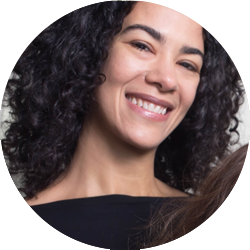“Why Some Kids Try Harder and Some Kids Give Up“: This post on how to give our kids a growth mindset is the most popular piece I’ve written in the past year. I’m guessing that’s not just because we all want to teach our kids how to persevere through challenges. I’m guessing it’s also because we wonder for ourselves: why do I try so hard; or why do I so easily give up?
And those of us in the second category, especially, wonder how we might scoot ourselves over to the first category.
Of course, researchers wondered that as well. They devised an intervention to see if they could move students from a fixed mindset to a growth mindset. And it worked.
First, mentors teach the students that the brain is like a muscle. They read an article describing how the brain becomes stronger when you exercise it; weaker when you don’t. How when you learn something new, you increase the number of connections between the neurons in your brain. How practice strengthens existing connections between neurons.
This change in density in various areas of the brain is something scientists can now see, using neuroimaging. It happens more quickly than once thought: within a matter of months. For example, take students who studied every day for three months before an intense medical exam. When researchers scanned the students’ brains, gray matter had “significantly increased” in various sections of the brain over those three months.
Knowing this–how incredibly malleable the brain is–helps pull you out of a belief that intelligence is fixed.
So does thinking about something that you’ve learned to do really well–specifically, the process of getting there. How you were much worse at this thing when you started. The mistakes you made, big and small, and how you survived them. How important the mistakes were to your progress. The role of practice, practice, practice to get so far. In the mindset-moving studies, after talking about the brain as a muscle, mentors led students in this kind of discussion.
This helps you recognize that mistakes don’t define you as a person, as you fear. Rather, mistakes are simply part of the process by which we learn anything new.
There’s more you can do on a daily basis to practice a growth mindset.
- When someone does better than you, and you start to think, “They’re so talented. I’m just not as good,” you can stop yourself and think, “Maybe they’ve practiced more than I have. I could do that, too.”
- When someone slights you, and you start to think, “They don’t like me; I’m not good enough for them,” you can stop yourself and think, “Maybe something else is going on in their day that I don’t know about.”
- When you make a mistake, and you start to beat yourself up over it, you can stop yourself and think, “OK, what can I learn from this?”
- When you’re asked to do something you haven’t done before, and you start to think, “I can’t; I’ll mess up; I’m not ready,” you can stop yourself and think, “Of course I won’t do it perfectly yet; I’m just getting started. This will be good practice.”
That’s what Carol Dweck tells us in her book Mindset: The New Psychology of Success. Dweck is the Stanford psychologist who conducted most of the studies on fixed and growth mindsets. Mindset gets into how our mindsets affect pretty much every area of our lives: school and sports, our work, our relationships with our partners and kids.
This concept has been important enough in my life, as someone who had a fixed mindset, that I created a video course on how to raise confident kids with a growth mindset. Check out my course on growth mindset here.
Written by
Tracy Cutchlow
Tracy is the author of the international bestseller Zero to Five: 70 Essential Parenting Tips Based on Science, a public speaker, and a creator of places to speak and be heard. Sign up for her newsletter here.

